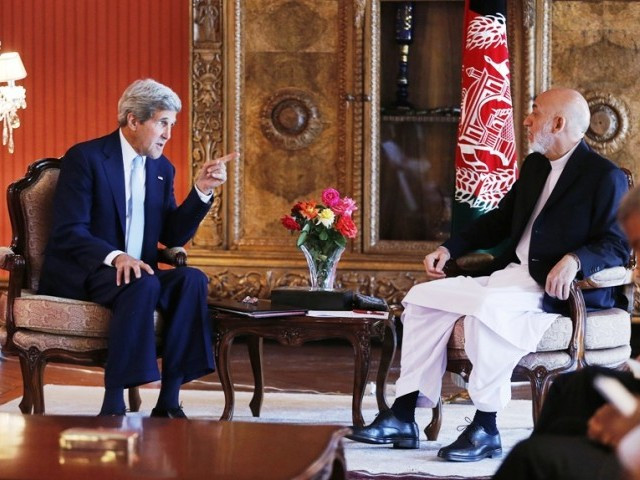Kerry holds second round of talks in extended Afghan visit
Kerry could not broker any deal on Friday thereby forcing him to extend his stay in Kabul for the election crisis.

Kerry holds second round of talks in extended Afghan visit
Hours after his arrival in Kabul early on Friday, he remarked, "Obviously, we are at a very, very critical moment for Afghanistan. The election legitimacy hangs in the balance, the future potential of a transition hangs in the balance, so we have a lot of work to do."
A section of the Afghan media is reporting that Kerry and Afghan leaders are likely to appear at a joint presser at the conclusion of their talks later on Saturday. However, there is no official word on the second day of talks.
The US Secretary of State, after meeting with President Hamid Karzai and the United Nations (UN) representative in Kabul, held talks with presidential hopefuls Ashraf Ghani Ahmadzai and Dr Abdullah Abdullah, in a bid to end the controversy over the election results, as well as to avoid any confrontation.
The US and its Nato allies had been concerned over a looming chaos following Abdullah's rejection of the preliminary results last week citing alleged fraud as his reason.
He had announced that he is under pressure to form a parallel government at a largely-attended gathering of his supporters.
Abdullah told his emotional supporters on Tuesday that US President Barack Obama had telephoned him and had promised to send Kerry to provide assistance in finding a solution.
Kerry, however, could not broker any deal on Friday and the complex situation forced him to extend his stay in Kabul.
Kabul had also been in the grip of speculations that President Karzai could install an interim government if both candidates failed to resolve their differences.
The name of the incumbent Interior Minister, Umer Daudzai, was prominently figured for the interim leader. These reports, however, have had no official reaction.
Karzai’s palace said that the president informed Kerry that he will transfer power to the new leader as per schedule, and that he would also accept whatever decision the two rivals take.
Dr Abdullah did not talk much about the vote fraud when he spoke with Kerry ahead of their meeting.
However Ghani said, “Our commitment is to ensure that the election process enjoys the integrity and the legitimacy that the people of Afghanistan and the world will believe.”
He also backed Abdullah’s demand for “the most intensive and extensive audit possible to restore faith” over the election process.
There are also rumours that the two rivals could agree on a coalition government as a result of Kerry’s initiative -- an idea that both candidates had previously ruled out.
Ghani, in his comments in the presence of Kerry had stated, “Our commitment has been to an inclusive government, a government that could represent all Afghans and serve every Afghan citizen in the manner that [they] deserve according to the constitution.”
Kerry also used his visit to hold a separate meeting with top Afghan security officials, including the interior and defence ministers.
The meeting would include discussions based on the fragile security environment in the country during which there has been an increase in the activities of the Taliban in the war-torn country.
The Taliban are involved in a fierce battle with the Afghan forces and have claimed taking control of parts in the provinces of Helmand and Ghor.
Kerry stopped in Kabul for the second day in view of the emerging political tensions that could threaten the security of the country at a time when foreign troops will be exiting, and would not want to reverse what has been achieved over the past 13 years.
The US also would also want to avoid delays in the signing of the Bilateral Security Agreement which is a controversial security pact that allows a longer stay of a few thousand troops -- an agreement Karzai had refused to sign.



















COMMENTS
Comments are moderated and generally will be posted if they are on-topic and not abusive.
For more information, please see our Comments FAQ